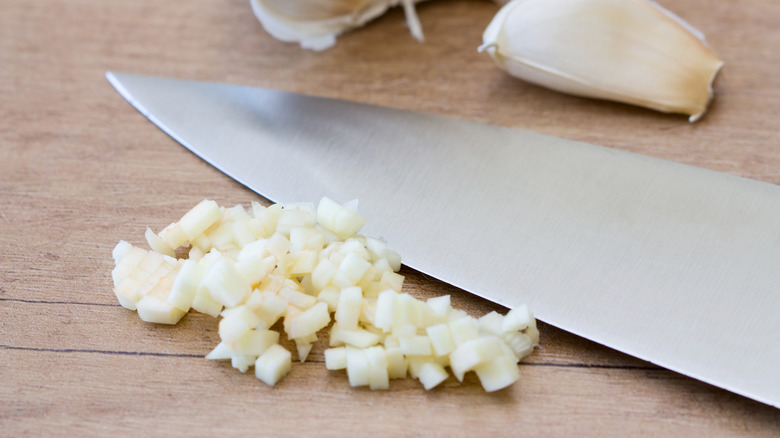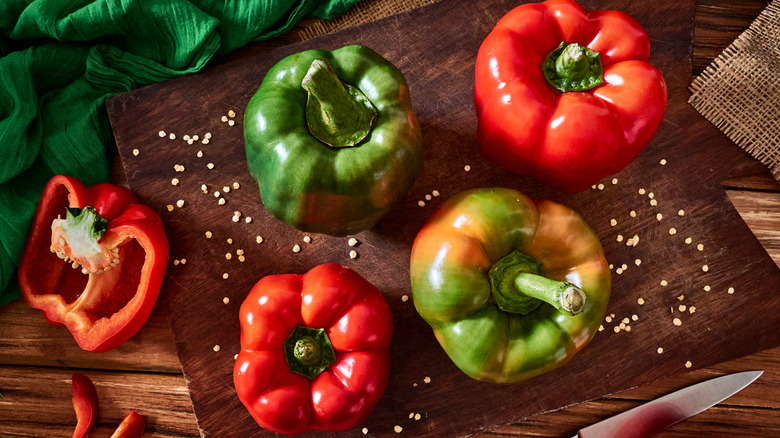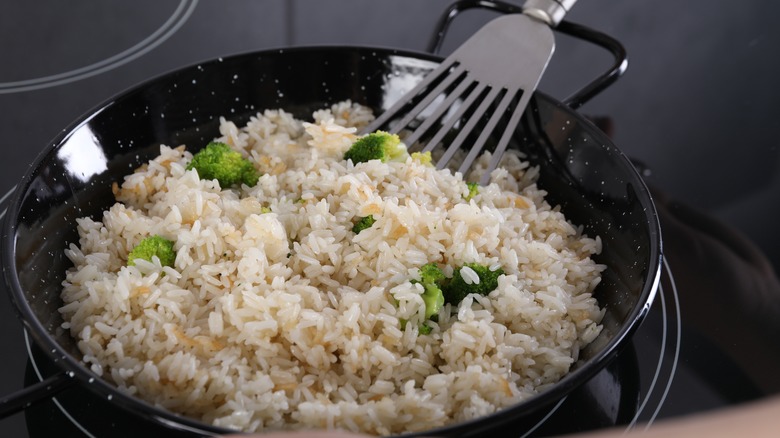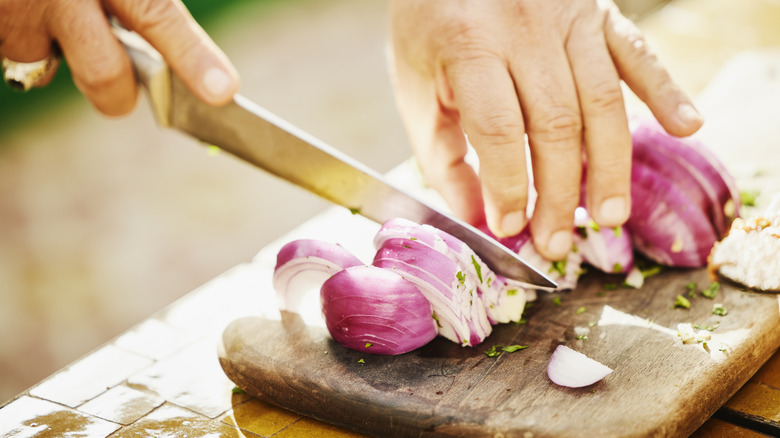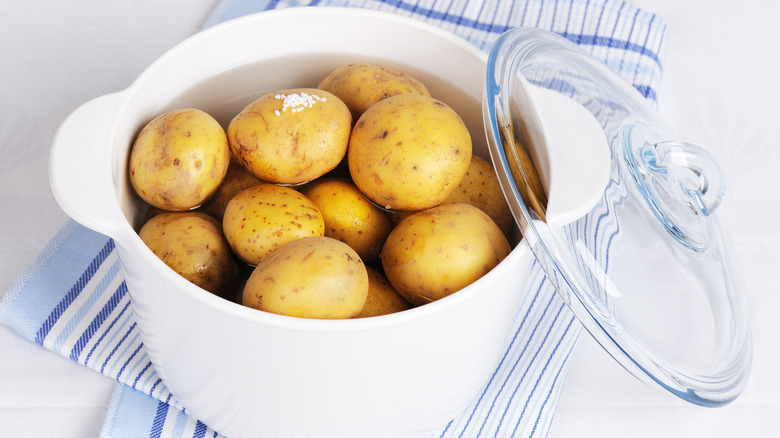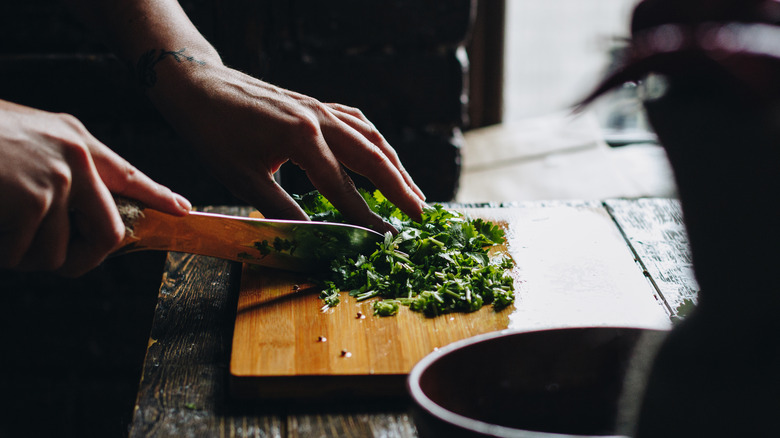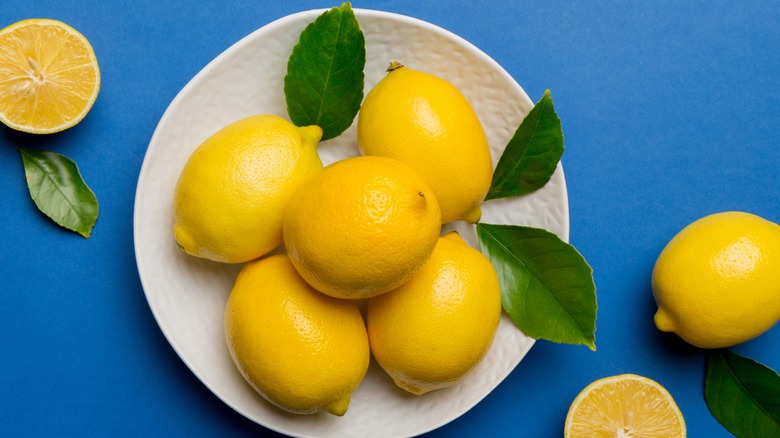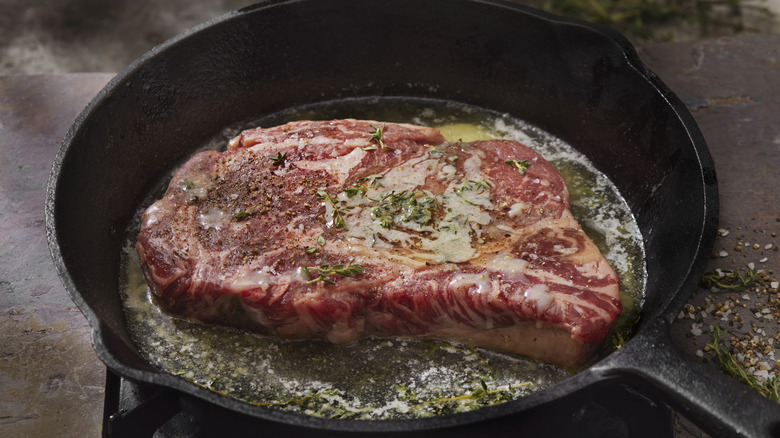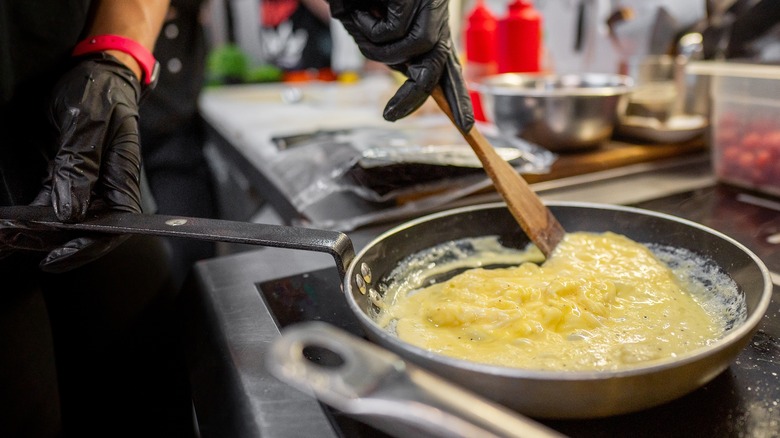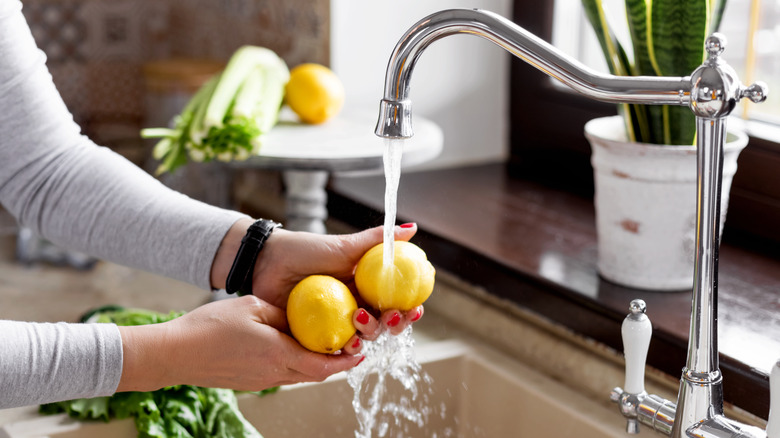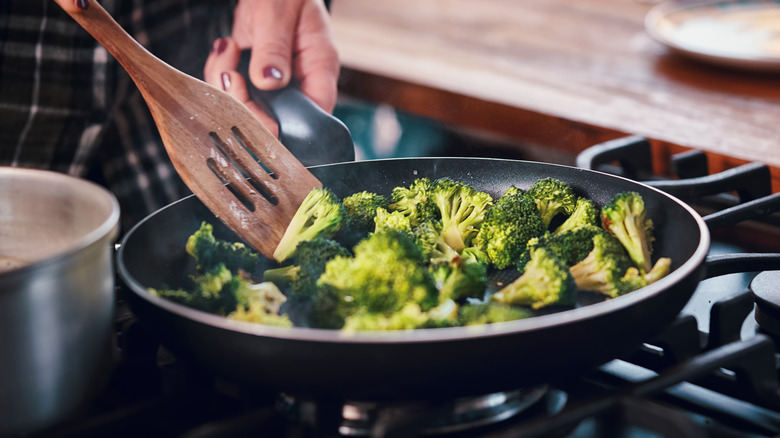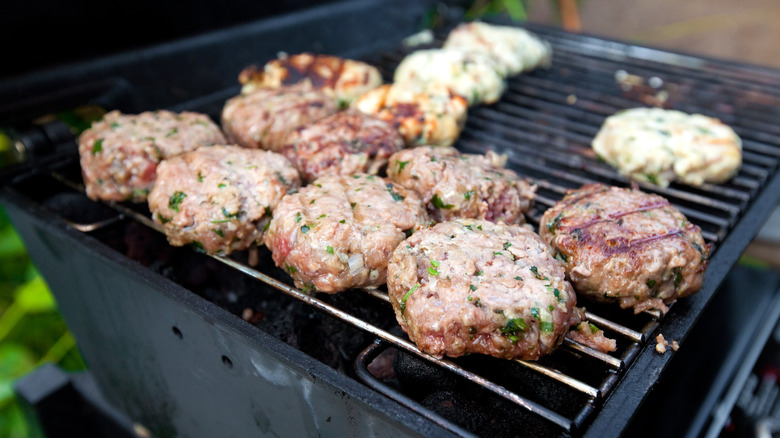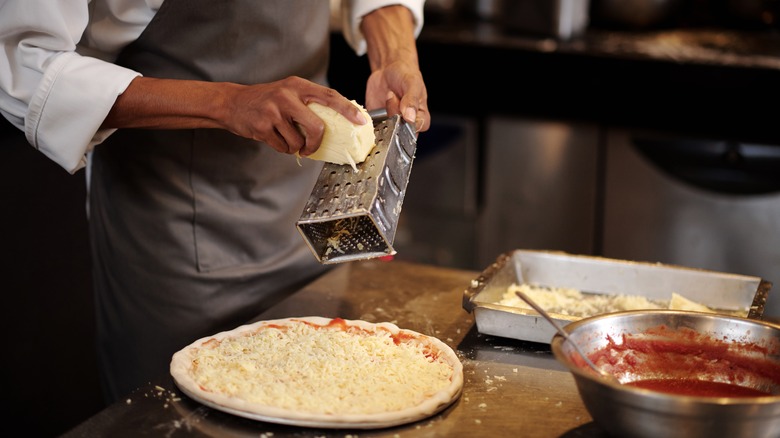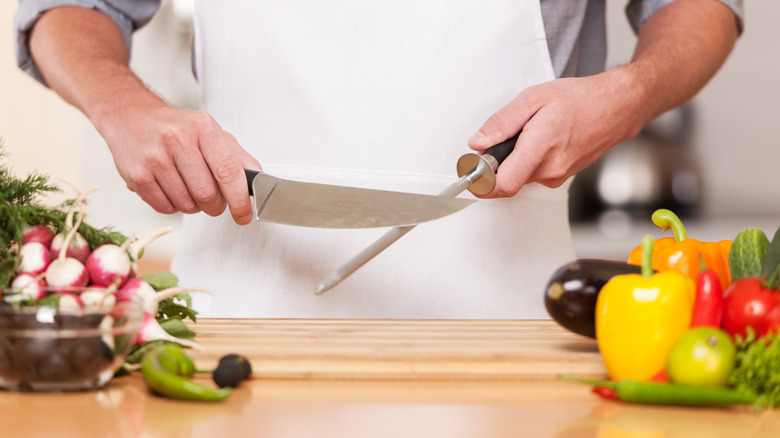14 Gordon Ramsay Cooking Tips You'll Actually Use
Are you ever overwhelmed by cooking advice from experts? You know they mean well, but when in your life are you ever going to have the time to embark on a culinary adventure that begins with a hack that just ends in frustration and mess? We compiled some of celebrity chef Gordon Ramsay's best cooking tips that are actually reasonable and useful and don't require you to turn your life upside down in the quest for better-tasting meals. Like our kitchen and food hacks that will change your life, most of these tips will streamline your process and reduce disasters and don't require the purchase of fancy equipment.
Is Ramsay right all the time? No. Some of his ideas don't translate to a regular home kitchen, and a few of his tips have been proven unnecessary. (Extra virgin olive oil in a pot of boiling water for pasta? We're not interested!) But a lot of his tips are good and helpful and will make your prep easier and food tastier.
1. Add salt to your cutting board when mincing garlic
Why does Ramsay salt garlic before mincing? Well, according to the chef (and science), chopping garlic on salt helps make the root vegetable even finer because salt is abrasive. In a YouTube video, Ramsay demonstrates this technique by first slicing the garlic and then putting salt on the cutting board before finely chopping. Ramsay says this method is effective because salt helps break down the garlic fibers, making it easier to chop and then eventually mince. If you want the finest chopped garlic, salt will get you there faster.
If you want garlic paste, using salt will also make your job easier. Mashing the garlic with salt on the cutting board helps soften its sharp flavor. As a cleaning bonus, salt will keep the garlic from clinging to your knife. So toss out the garlic press — you don't need it or the mushy mess that always seems to get left behind in the tiny holes. Just make sure you're not oversalting your food, and adjust the recipe as needed in terms of saltiness.
2. Cut your bell peppers upside down
How do you cut bell pepper so there's minimal waste and mess and great slices that warrant praise? Sometimes, it seems like there's no right way, as you'll almost always end up with seeds all over the cutting board and pepper slices that don't seem like they're the right size. Maybe you're a chaos cutter, and that's fine. But for folks who want more control over their pepper-cutting experience, Ramsay has an easy tip: turn that pepper upside down.
Ramsay says to choose bell pepper based on smoothness and firmness. Then, remove the stalk with a knife and put the pepper upside down, slicing downward and around the seeds. Once you cut the first piece, you will clearly see how to slice the rest. You'll be left with what looks like the skeleton of the pepper — seeds and all. These slices can further be cut into nicely sized strips. Just flatten them first and put the skin side down on the board before cutting. Ramsay says this way of cutting the pepper is faster and neater. Make life easier for yourself and try it.
3. Season your rice while it cooks
As a rule, you should season food every step of the way for the best-tasting dish. This also applies to rice. There are all sorts of ways to add flavor to the dish, including salt, pepper, garlic, onion powder, lemon zest, and cumin. Ramsay says you shouldn't wait until the rice is cooked to add seasoning, though. By seasoning rice while it cooks, the flavors are absorbed perfectly with help from the heat. Adding spices to an already-cooked dish can work, but there's the possibility that you will over-season or under-season a particular area. When cooked together, though, there is a more harmonious blending throughout.
Ramsay prefers using whole cardamon pods, salt, pepper, and star anise seeds in his rice. If you're using a rice cooker and not a pot on the stove, you can do the same thing. With a pot, Ramsay says to rinse the rice in cold water, always start the boiling process with cold water, and allow it to steam with the lid on so all those flavors mix together for a fragrant and delicious side dish.
4. Chop an onion the easy way
Oh, onions. So good, and yet so many tears! You start off with good intentions, and halfway through, tears prevent you from cutting in a straight line, and you end up with hacked-up onion bits before running out of the room for a few minutes lest you chop your fingers through the blur. Why does this happen every time? It's a result of a chemical called syn-propanethial-S-oxide that's released from the vegetable when it's cut, explaining why onions make you cry.
To reduce tears and lessen pain from stinging eyes, chill the onion for 5 to 10 minutes before cutting. Always opt for a sharp knife, then peel the onion and cut it in half. The knife should go in halfway as you hold the onion in place like a ball and cut in the opposite direction. Avoid the root! As Ramsay says in the YouTube video, "That's absolutely crucial — leave that on there. Cut that off, the onion will start to bleed, and you'll start crying rapidly."
5. Put potatoes in cold water first
Put your potatoes in cold water, not boiling water. Ramsay says this will help the potatoes start cooking at the same temperature. "This way, by the time the centers of the potatoes are cooked, the outside won't be falling apart," he explains on YouTube. Bonus: You won't burn yourself as you plop potatoes into scalding water. You should also see more of Ramsay's best tips for cooking potatoes.
Another reason for cooking potatoes in cold water is that potato starch reacts badly when it comes into contact with hot water, and this can cause the vegetable to cook unevenly and become mushy. When the potatoes rise to the temperature slowly and consistently, they will not become a combination of soggy, mush lumps and hard knobs — they will be ready for the next step of your meal preparation.
Speaking of meal preparation, parboiling potatoes before roasting them is also a game changer. Just boil them for about 15 minutes or until they are able to be pierced with a fork. Then, go ahead with your typical potato roasting process. Ramsay says dusting your potatoes with flour before putting them in the oven will make them extra crispy.
6. Chop your herbs carefully
Fresh herbs brighten up every meal with a burst of flavor, but you have to treat them well. You don't want to cut them wet, and you don't want to rip them. This could cause bruising, which occurs when too much external force damages the cell walls. When herbs are bruised, their flavor level diminishes as a result of losing oils. They also end up looking a bit battered and brownish. So, in order to make sure your herbs make it to the plate in great shape, follow Ramsay's three-finger rule for chopping herbs.
As always, make sure your knife is sharp. Dull blades are unsafe and can also damage the herbs. Ramsay suggests holding herbs with your middle finger in front of the index and ring finger. Then, tuck your nails under and cut away! The technique pretty much works for all herbs, but you may want to get even more specific. For example, in Ramsay's stacking technique for chopping basil, create a tower of about 10 to 12 leaves, with the largest at the bottom. Then roll them all up like a cigarette and cut! The fancy name for this method is chiffonade, and it creates nice strips of basil.
7. Roll lemons before juicing them
Lemons, lemon juice, and lemon zest are fantastic and easy ways to brighten meals, both sweet and savory. Whether being used for a simple lemon chicken, lemon pasta, or lemon cookies (and don't forget, of course, cocktails and non-alcoholic drinks that use this versatile citrus), lemons are pretty perfect. And they look so pretty hanging out in a bowl on the counter! You want to get the most you can out of your lemons, right? Follow this tried-and-true technique that Ramsay advocates: roll lemons before you juice them.
Rolling a lemon on a hard surface right before squeezing it will bring the juices to the surface. This will work with any lemon, but it's especially great with lemons that aren't totally ripe. It's always a good idea to pick the largest and brightest lemons. If you want to save the lemon zest, remove that first. You can store lemon zest for up to three months in the freezer as long as they're in a freezer-safe bag.
8. Focus on searing steak
Cooking steak at home can be daunting, but it doesn't have to feel like a stressful endeavor with Ramsay's simple tips. Before you even think of throwing that steak into the pan, take it out of the fridge and let it rest on the counter for at least 10 minutes. This will allow it to cook more evenly throughout and reduce the possibility that you will cook an over-chewy steak. Ramsay also says that you should season your steak heavily. You can use whatever season you prefer; Ramsay uses freshly grated salt and pepper.
Here's Ramsay's ultimate tip for searing the perfect steak. While the steak is cooking in a well-heated pan, keep an eye on its color before turning it over. "No color, no flavor," is his motto. His advice is to not flip the steak unless you can see color on the side that is being heated. When it's time to remove the steak, melt some butter in the pan to enhance flavor. From here, let the steak rest some more before serving it, ideally for 5 to 7 minutes.
9. Don't whisk your eggs
The chef is famous for his eggs, and one of his tips will make things easier for you (and even save a dish). Ramsay never whisks his scrambled eggs; instead, he uses a rubber spatula to break up the egg after cracking it whole into the frying pan. But why does he do this when so many other famous chefs insist on whisking eggs? He prefers to fold the eggs as they cook in butter, explaining that this technique will allow them to have less of a grainy consistency. Ramsay then stirs the eggs frequently on high heat, taking the pan on and off.
But Ramsay isn't done when the eggs are cooked. He adds crème fraîche right before taking the eggs out of the pan. Adding cold dairy prevents the eggs from becoming overcooked, as the heat of the pan will continue to cook the eggs even after you take them off the stove. When making scrambled eggs, chefs usually add some kind of liquid, either milk or water. (Water vs. milk: Here's what you need to know when making fluffy scrambled eggs.) There's debate about which is better, but use whichever one makes the eggs you like the most. Some people like very fluffy eggs; others like denser eggs. Water will make them fluffier, and milk will make them denser.
10. Rinse your hands with lemon juice after cutting hot peppers
Have you ever washed your hands after chopping up some habaneros for chili only to rub your eye and get an unpleasant surprise? We've all been there. Ramsay's advice will help make sure you really get those oils off. Basically, he says just rinse your hands in lemon juice. Lemon juice is an acid with a low pH. The chemical capsaicin, which gives hot peppers their fiery taste, has a high pH. Therefore, lemon juice will neutralize the capsaicin by bringing the pH level toward the middle of the scale.
Aside from neutralizing capsaicin, lemons also help with basic cleaning, so they pull double duty. They remove grease from your hands, and when you're cooking with fish, lemons can neutralize the smell of seafood on your hands. Always wash your hands with soap and water afterward! Lemons are great, but you need soap to really get rid of bacteria. If you're trying to clean stains on your cutting board, lemons will help because of their acidic properties. Lemons are magic!
11. Make sure broccoli stays crisp
There are so many ways to cook broccoli, but which one is the best and simplest? Ramsay's is pretty easy — just throw them in the pan right after soaking them in cold water. In a YouTube video, the chef implores that the broccoli must be drained after it's cooked, which will prevent it from becoming mushy. Additionally, Ramsay puts this drained broccoli in a dry pan — not the pot it was cooked in — to be seasoned. Putting it in the dry pan "gets rid of any excess moisture," he says. Ramsay then adds seasoning, such as garlic, salt, and pepper. Broccoli is also really tasty with red pepper flakes — if you want some spice.
If you prefer mushy broccoli (hey, we don't judge), why not go all in and make Ramsay's broccoli soup? This is a pretty simple recipe with only five ingredients. You'll need broccoli florets, salt, ground black pepper, water, and olive oil. Blend the cooked broccoli florets first, then the leftover water from the broccoli pot. Pulse it a few times. There are two extra steps if you want to make the fancy version: Add goat cheese and walnuts at the bottom of the bowl before you pour in the soup. Easy stuff!
12. Baste your burgers
Grilling burgers during the summer is one of life's little pleasures. But do you ever overcook your burger or find that it's not as juicy or flavorful? Ramsay has a helpful tip: baste the burger with butter. Many of us are familiar with Ramsay's burger recipe, as it's pretty famous. There are variations of this recipe, but the process is just as important as what goes in the burger.
Ramsay's recipe calls for ground beef, egg yolk, a frozen red chili pepper, salt, and pepper to be mixed. Once integrated, let the patties rest. The grill or pan should be fully warmed before placing the patties on. Once they're in place, drizzle some olive oil on them and add salt and pepper. Cook the burgers for about three to four minutes on each side, but if you like them more well done, keep them on longer as per your preference. Then, make your big move. Right before taking the burgers off, baste both sides with soft, unsalted butter using a brush.
13. Shred mozzarella frozen
If you've ever wanted to grate fresh mozzarella onto your meal, whether you're making pizza from scratch or a lasagna, this one is for you! Fresh mozzarella, as you probably know, is moist. It will clog up your traditional metal cheese grater and plop down in uneven blobs and clumps instead of nicely shredded strips. The solution is to firm the cheese up a bit first. You can do this by putting your mozzarella in the freezer.
To make the grating process effortless, Ramsay says to leave the cheese in the freezer for 10 minutes before you start to grate. When it's ready, use the side of the grater that you prefer and switch sides of the cheese back and forth so one area doesn't get thinner than the other. There! Now, you're not wasting any cheese, and you'll have a nice, evenly spread base of mozzarella for your dish.
14. Sharpen your knife
Making sure your cooking tools and equipment are in good shape is the golden rule of every chef — Ramsay included. Before you even start to think about dinner, look at your knives. Chances are, you've got a few different kinds, and they all haven't been honed or sharpened in a while. So, sharpen your knives and check out our ultimate guide to kitchen knives: when and why to use each type.
If you're feeling intimidated at the prospect of sharpening your knives, there are a few techniques and tools you can use. Here's everything you need to know about keeping your knives sharp. First, look for preventative tools. You can get a knife guard, which will lessen the chances of the knife becoming dull in the first place. Check out your cutting board — is it hard? Try switching it out for one that is made of softer materials. And there are best practices. Don't put it in the dishwasher! This will also dull the blade. Lastly, are you confused about the differences between honing your knife and sharpening it? You shouldn't be sharpening your knife as often as honing it — you should sharpen your knife about every few months.

